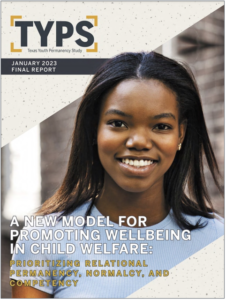Home » About Us » Reports » A New Model for Promoting Wellbeing in Child Welfare: Prioritizing Relational Permanency, Normalcy, and Competency
A New Model for Promoting Wellbeing in Child Welfare: Prioritizing Relational Permanency, Normalcy, and Competency
 Over the past 3 years, our Texas Permanency Study (TYPS) has followed 197 youth in foster care to discover what helps them thrive in adulthood. Our final report shows that promoting wellbeing in child welfare means:
Over the past 3 years, our Texas Permanency Study (TYPS) has followed 197 youth in foster care to discover what helps them thrive in adulthood. Our final report shows that promoting wellbeing in child welfare means:
- Prioritizing lasting connections with caring adults, peers, and community
- Providing an environment conducive to normal and developmentally appropriate social experiences
- Supporting the development of competency through experiential learning
- Increasing social emotional wellbeing through mental health services and sexual health and relationship education
Our study did not support the expectation that youth who attain legal permanency have better outcomes in emerging adulthood than youth who age out of foster care. Instead, we learned that relational permanency and normalcy are the foundation for competency and wellbeing. These concepts are inextricably interwoven and need to be addressed holistically. Rather than focusing solely on attaining legal permanency as a measure of success, a new model for child welfare should prioritize relational permanency, normalcy, and competency.
Learn more about the TYPS project and our recommendations for promoting wellbeing in child welfare, check out our full report below. And make sure to
sign up for TXICFW’s newsletter to stay up-to-date on future research findings!

